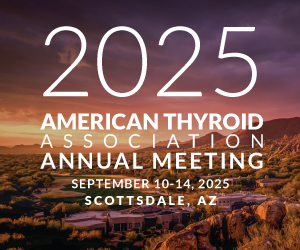June 19, 2000
The American Thyroid Association has learned that ipodate (Oragrafin) is no longer available. The compound had been distributed by Bracco Diagnostics.
Iopanoic acid (Telepaque) is another radiograph contrast agent used to treat severe hyperthyroidism. It is currently distributed through Nycomed Amersham.
The “off label” use of these two radiocontrast agents to treat hyperthyroidism is not approved by the FDA. Nonetheless, several clinical studies have demonstrated their effectiveness in the short-term treatment of severe hyperthyroidism. Their most important mode of action is the inhibition of conversion of thyroxine into triiodothyronine by deiodination. Their effectiveness exceeds those of other pharmacological agents. However, they appear to have little or no role in the long term management of hyperthyroidism (Roti et al. Metabolism 42:403,1993; Wang et al. J Clin Endocrinol Metab 65:679, 1987).
There are no clinical studies comparing the effectiveness of these two agents. One in vitro study (Chopra et al. Recent Progress in Hormone Research 34:521, 1978) using liver homogenates indicated that iopanoic acid is approximately two-fold less effective (by weight) in inhibiting the conversion of thyroxine to triiodothyronine. In another study (Suzuki et al. Acta Endocrinol 92:477, 1979), giving 3 g of each agent for 3 days to subjects without thyroid disease, ipodate and iopanoic cid had nearly equal effects on TSH, T4 and T3, but ipodate caused a larger increase in rT3. For those who have previously used ipodate, the limited data available suggest that a similar starting dosage of iopanoic acid may be appropriate.
The Public Health Committee will continue to monitor the status of these agents and has initiated discussions with Bracco Diagnostics about the possibility of reversing their decision to discontinue ipodate production. The committee would appreciate any suggestions about methods to ensure the continued availability of compounds in this class. Write to ATA Director of Public Affairs at thyroid@thyroid.org



